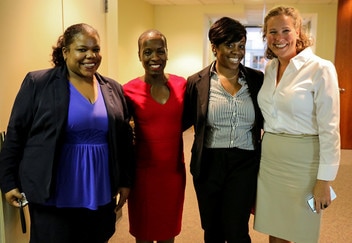 Stop pretending! We have to stop pretending! Pretending that everything's okay when it's not; pretending that we're happy and satisfied when we're not; pretending that we know what we want when we don't; and pretending that we have all the answers--or any answers--when we have none. Don't get me wrong: some people are outright deceivers, and it's their goal to mislead others into believing they are someone or something they are not. But the pretending I'm talking about is not, necessarily, something we do intentionally, as though we set out to deceive the world around us. This has more to do with what we don't do, or yet, what we often don't say, because we're concerned about what other people might think. That's because we're so conditioned to thinking that if we become utterly-honest, somehow, we're not wearing our best face or putting our best foot forward. Heaven help us if, by chance, someone found out that we're really not okay, that we're really not happy, we're really not satisfied, that we really don't know what we want, and that we don't really have all, or any, solid answers to life's tough questions, including our own. Seriously, though, what do we genuinely have to lose for just being honest? Whatever might, supposedly, be lost, is it truly genuine and of real value? Within one week, I had two very-telling conversations. The first was with a woman, who's very unfilled at work. Several years ago, after a long history in her very-established career, she was let go due to massive downsizing. After not being able to find employment that matched where she was before the downsizing, she finally took a less-than-ideal position because she didn't want to be unemployed any longer. During our conversation, she shared how she had finally acknowledged that she had been depressed. She said that prior to her own bout with depression, whenever she heard someone say they were depressed, she always thought, "Come on, just get over it!" But, she now knew that depression is very real and that she's glad she could finally admit that she was not okay. My second conversation was with a woman, who's also been looking for her "Next." She's been searching for work and has interviewed for several positions, trying to find the "right" fit in a position she would really want. Only thing is that, recently, she realized that, at this stage in her life, also after a long history in a very established career, she doesn't quite know what she really wants to do, so finding her "Next" has been quite difficult. Even though she's unsure, the breakthrough has been in being able to admit that, right now, she doesn't have concrete answers to questions she's repeatedly asked like, "What kind of position do you want?"; "What are you looking for?"; and "Exactly, what do you want to do?" Somehow, we believe as though admitting what we believe to be less-than-favorable about ourselves is, somehow, admitting failure and will, in some way, keep us stuck and imprisoned in the circumstances we admit. But the exact opposite is true. After spending so much time, energy, and money pursing a certain career and type of work that, at some point, I thought I wanted, the day finally came when I had to admit that, in spite of huge investments and many sacrifices, I simply no longer wanted it. My appetite had changed, so not only did I no longer want it, I had to also admit that I didn't want to spend any more time or do one more thing to try to convince myself that I did or that I should and that if I didn't, something was wrong with me. But admitting this didn't keep me stuck on a treadmill I no longer wanted to be on. If anything, being honest enough to admit what I no longer wanted freed me from the bondage of staying on a path that I no longer wanted to travel but felt chained to because of my failure to admit otherwise--pretense. Just because sometimes things are not okay, or because sometimes we are not okay, or because we no longer want the things we once wanted, or we do things we really don't want to do, or because we don't always have answers . . . none of these equate to pretending. We pretend when we don't admit that these things exist, especially when our failure to admit them is out of our fear of what others might think of us. How freeing it is to remove our own masks, with the least bit of guilt and the least bit of shame, and be able to say, "Things are not okay; I'm not doing well; I used to be so sure of what I wanted, but now I have no clue; and on top of all that, I have no idea where to even begin to turn my situation around." You may have to muster up the courage to make such a bold confession, but after you do, even if nothing changes right away, at least, you'll be free from the shackles of pretense and the fear of not having the validation, stamp of approval, and acceptance of others. So, again, let's stop pretending!
0 Comments
 Whether personally or professionally, the greatest investment we can make are the investments we make in other people. Relationships are so essential to our lives and to the quality of the lives we live that maintaining good relationships is a value worth having. And it's not just "Relationships"; that's so broad. It's "Friendship"; that's what we're talking about. The funny thing is that many of us tend to know that friendships are important, but, yet, we often don't value them as greatly as we should or as much as we say or believe we do. In fact, sometimes we devalue them because, even though we know how essential they are, in the grand scheme of things, so many other things seem so much more important: family, career, and education, just to name a few. For some, here's how the cycle goes: we go to college; after graduation, we set out to build a successful and satisfying career; maybe we've been dating or we meet that man or woman of our dreams; then we get married; then have children; then we decide to further ourselves professionally and go back to school for another degree or certification (and in some cases, maybe to finish a degree we previously started); then we set our sights on a new position, new employer, new career; and the cycle continues, repeating itself. But in the midst of this, what often happens? Because we become so focused on these very valuable and important life activities, we sometimes fail to give attention to the also valuable and important activities of building and maintaining genuine, meaningful, lasting relationships, including friendships that we truly enjoy. Some have the habit of associating having friends strictly with personal life and don't see its place and value within our professional lives and in the workplace. Many have the mindset that says, "I'm just here to do my job; that's it!" But what we sometimes fail to realize is that, yes, our primary role at work, or even in business, is to get a job done. Many opportunities, however, come by way of some relationship we've managed to build, and sometimes they come because someone considers you or me to be a friend. There's absolutely no question that we have to be capable and competent to get the job done, but regardless of how capable and competent we may be, so many "jobs" will pass us by if we don't have the right relationships and friendships in place. A number of years ago, I was in full-time private law practice, but early in my practice, through very little effort of my own, I was able to kindle a relationship with a distinguished New York State Supreme Court judge, which later proved to be invaluable. Let me tell you how this happened. Prior to that time, I had been considering different bar associations to join. I began to zero in on one in particular and reached out to a few board members to learn more about the organization. After a series of telephone and by-chance in-person conversations with some of the members, with whom I had developed a really nice rapport, I finally decided to attend a meeting. At the end of that meeting, one of my new friends came to me and said that they wanted to introduce me to someone. They walked me over to a woman, introduced us, and the woman, the Supreme Court judge, happened to ask me where I had been working prior to entering private practice. As soon as I said the name of the company, she immediately responded by telling me that the company’s president/CEO, with whom I had maintained a very good relationship, was an old law school friend. Needless to say, over the years, my relationship with this judge has become one that I will forever cherish and has had a significant impact on my success, all because of the friendships and relationships "at work" (literally and figuratively) at the time we met. So, what's the take-away? The take-away is that relationships matter! Friendships matter! Whether personally or professionally, they matter! Whether just hanging out and having a good time or attending an affinity meeting or professional networking event, building friendships matters! And we don't build relationships and make friends just because doing so can lead to opportunities; we do it because we care about people and value sharing in and enriching each others' lives. We understand that great relationships lead to great experiences. We also understand that friends care about each other, encourage and support each other, and want good things for each other, and if there's a way they can help make good things happen, they're more than ready, willing, and happy to do so. Contrary to what many adults believe, having friends is not something we do just during childhood. Adults need friends, too! Whether at home or at work, personally or professionally, in business or in pleasure, or in our living rooms or our board rooms, life is so much more enjoyable when we share it and do it with friends.  It's that time of year again--January--and let me guess: you've set some goals for yourself? You have; I have; many people have. The beginning of the year always seems like a great time to set our sights on new visions, new levels, and new endeavors for ourselves or a great time to revisit some old ones that we've not, yet, achieved. So, let me ask you this question: with practically one full month under your belt, how's it going so far? Are you on track? Have you fallen behind? Or are you farther along than you expected to be? And if, by chance, you're not where you had hoped you'd be after one month in, how do you feel about that? Are you beating yourself up, or are you going easy on yourself? As I check my own progress on a few goals I've set, I will tell you: I've trailed off a bit. I started the year strong, and during the first week of the year, I was determined; I was consistent; and I was on fire. As the weeks have gone on, however, I don't know that my fervor has dimmed, but my schedule has kicked up, making it more and more challenging to carve out the necessary time and attention to invest in moving myself closer to what I want and to where I want to be. Maybe you can relate to what I'm experiencing, and if you can, maybe you do what I tend to sometimes do. I can be really hard on myself for what seems like shrinking back off of my grind to consistently press toward my goals. I'll even go as far as to question whether I'm really disciplined enough to turn my thoughts and desires into actions and my actions into practical realities of the visions I see. And then, with nearly one whole month gone, I've, at times, chastised myself even more harshly because of just that: nearly one whole month has gone, and what have I accomplished?!?! At times, I can really beat myself up: one, for allowing days to pass, where I haven't aggressively stuck to my plan; and two, for allowing so many days to pass, where I haven't stuck to my plan. But let me now share the other side of the conversation. Out of twelve months, one month has passed, and only one month has passed. When January ends, I'll have eleven more months, 334 more days, to get back in my saddle and get at it again. Maybe I won't make a daily investment towards turning my thoughts into actions and my actions into realities, but that doesn't mean I've dropped the discipline ball. It may simply mean that I just didn't get to it on that day. I'm not down for the count just because I didn't, and I'm no slacker with no discipline even if my reason for not getting to it is because I simply didn't feel like it or want to that day. The choice "to" or "not to" is my choice to make, and as long as I'm okay with the results of my choices, then whatever way I pace myself is fine. The point I want you to take away is not so much about setting goals and whether it is or is not okay to pursue them. We should set goals. We've each been placed on this earth with a purpose, an assignment, to fulfill, and the responsibility of goal-setting helps us identify, pursue, and fulfill whatever those purposes are. The point I do want you to take away is this: even if not every day, each day you take a step towards achieving your goals, however many or however few, is a day that counts and puts you one step closer to getting there. So, don't be so hard on yourself if your rhythm is not as rapid and as steady as you hoped it would be when the year began. Take it one day at a time. Instead of measuring how much progress you're making against how much of the year has passed, track your progress one day at a time: "Have I done one thing today to move me closer to what I want and to where I want to be?" If the answer is "Yes," then great, you're a little bit closer than you were the day before. If the answer is "No," don't focus on where you are within the 365 days of the year--how much year has passed, how much year is left. Set your sights on tomorrow; plan to get at it then; and then put your best foot forward. Remember, we're taking this year and the goals we've set, day-by-day, one day at a time!  When we near the end of one year and anticipate the start of a new, there's typically a lot of buzz in the air about what each new year will bring and all that we have to look forward to: new energy, new opportunities, new experiences, new relationships. And this time around, no different than others, there's a great deal of excitement and anticipation in the atmosphere about what 2017 will hold. Before you exit 2016, however, and leap into the New Year, I encourage you, even challenge you, to do something before you make that leap. Regardless of what kind of year this year has been for you--your best year, yet; your worst year, yet; or somewhere in the middle--over the next few days, before this year ends, take some time to reflect. Whether a few minutes or a few hours, carve out some time to think about this past year. If 2016 was a stellar year for you, where you accomplished many achievements and experienced many milestones, take some time to reflect on and savor them before you bolt into 2017 full speed ahead. Or maybe this year hasn't been all or any of what you envisioned it would be when the year started. Perhaps, you've had some setbacks and you're trying to make a comeback that hasn't yet happened. Maybe you've encountered some hurdles that you have still, yet, to conquer. Or you're climbing a mountain or digging out of a ditch, where the top nor bottom are nowhere in sight. Still, I encourage you to take some time to reflect. Years ago, I began forcing myself to pause and ponder, particularly in between transitions, especially when winding down one year and approaching a new. By nature, I have a very hyper-active mind, so as soon as I enter a new experience or experience a new achievement, accomplishment, or milestone, I'm already automatically thinking about the next one unless I intentionally "put a pause." I've had times where I've arrived at situation "A" and within minutes of my arrival, even though I'm physically still there, my mind is already on to situation "B." So, unless I force myself to slow down, and maybe even stop, I'll just race from one place to another, from one hurdle to another, from one milestone, mountain, or ditch to another, or from one year to the next without ever taking time to reflect as I transition. But why reflect? Why is reflecting so important? Why have I asked you to do this? Simply, because I'd like you to experience the value of, at least, three benefits that reflecting has to offer regardless of what kind of year you've had:
 Failure. Disappointment. Both are natural human responses. When we've tried and what we've tried do not work, it's natural and normal to feel as though we've failed and to, therefore, feel disappointed. So, don't let anyone tell you otherwise or try to make you feel guilty, abnormal, or weak just because that's what you feel. If you've invested time, effort, and resources, especially if you've invested lots of them, for what you hoped to be successful to only turn out opposite, doesn't it make sense that you're going to experience some sort of emotional response that's not thrill, happiness, or excitement? The end result of disappointment may be the same for many of us, but what gets us there may differ. For you, it may be not getting a job you so wanted and just "knew" you would get. For me, maybe it's not getting a client that I zealously pursued for some time and at great length. For others, it may be a myriad of other reasons: not getting a well-deserved raise, bonus, or promotion; the seller of a house that's absolutely perfect for a family accepts their offer to buy, but the deal ends up falling apart; maybe it's not getting accepted into a college or university of one's dreams and the resulting disappointment for the student and their parents; or, yet, perhaps a failed relationship that seemed so destined to succeed. These are just a few, but no matter what the cause, we're left feeling very much the same: disappointed and as though we failed. Whenever I reflect on my own feelings of failure and disappointment, I usually think back to an experience I had years ago when I was transitioning into the legal profession. I had heard plenty of stories about how difficult it is to not just land an associate's position at a top New York City law firm, but how slim the chances are to even be considered. When an opportunity, nonetheless, to interview for a prominent firm came my way, I decided to give it a shot. After a series of interviews and completing an extremely daunting writing sample, a memorandum of law, I was more than thrilled to learn that I made it to the final round of consideration. I was now one of four finalists, and only one of us would be selected, but I had been assured that of the four, I was the most likely candidate to be selected for the position. So, I had my final interview, I confidently answered every question thrown at me, and I came away knowing I had put my best foot forward. By now, though, I'm sure you know what happened. You guessed it: I didn't get the position! And not only did I not get the position, they had to nerve to tell me, of all days (albeit, unbeknown to them), on my birthday! I don't believe anyone could have had any idea how disappointed I felt. Here I was thinking I'd receive the best birthday news ever, but, instead, I received the exact opposite. Not only did I have to deal with the overwhelming shock of it all, I could not wrap my brain around how I had failed at something I was almost assured of getting. My disappointment was so dark that I felt like there would never be another opportunity that I could or would ever possibly want as much as I wanted this. I felt at such a loss for where I missed it or dropped the ball during the interview. I felt like I had been set up all along to think I was a highly-viable candidate to only be rejected and rejected on my birthday. I could not recall too many other times when I felt so low, but as low as I felt, as much failure as I felt, as much disappointment as I felt, I had to eventually do what we all must do. Yes, we should grieve our losses, our failures, and our disappointments when they occur. And, no, grieving our pain versus having a pity-party are, in no way, the same thing. But, after awhile, even if very slowly, assuredly, the light will shine again, and when it does, how should we respond? Instead of doing whatever we can to dim the light that naturally wants to shine after a period or season of darkness, we should welcome that light and embrace it as the sign of hope that light represents. So, in spite of our losses, failures, and disappointments, eventually . . . after awhile . . . let's let light shine!  At some point in our careers, and maybe more than once, many of us decide that we want to make a change. In spite of how long we've worked in a particular field or profession, we decide that we would like to do something different. Maybe we'd like to pursue that thing we've always dreamed of doing; or maybe it's a new-found love that we do on occasion but long to do on a full-time basis; maybe we no longer enjoy doing what we've done for the past twenty years; or maybe we've been downsized and have decided that this is a good opportunity to make a much-needed, long-awaited change. Whatever way we discover or experience this new pull, it all boils down to wanting to make a shift in our careers after having invested significant time in the work we've been doing, possibly, for years. We've heard of people, and may even know some, who have successfully changed career lanes and the type of work they do: the systems analyst who became a school teacher; the lawyer who became a non-profit director; the social worker turned college professor; the accountant who becomes a real estate agent; the nurse who's now an interior designer; the journalist who becomes a pastry chef; and we could go on. But how does one really do this? How do we successfully transition from one career and line of work to something, sometimes, starkly different? And not just transition, but transition without what many of us want to avoid: without starting from the bottom or from the beginning within our new industry? Let's face it, if you've worked in a field for a good number of years, you've, likely, advanced in that particular field in more ways than one: in knowledge, experience, and, of course, in salary. And chances are, the salary range you're in is the salary range you'd like to keep when you enter your new profession. I cannot tell you how many attorney-friends I've had over the years, particularly women with young children, who, at some point decided they wanted to make significant changes in their careers and maybe even stop practicing law altogether--a song I personally know all too well. They've usually started out, just as I, insisting that, in their new professions, they earn the same amount of money, that they work fewer hours, and that they have much more flexibility in their schedules so they can spend more time at home and with their kids. But what are some realities? Well, for starters, one is that you have to actually qualify to enter the new profession, which may mean going back to school, getting another degree, and maybe even volunteering in the new field to build the knowledge, experience, and relationships necessary to fully make the transition. Another is that once you qualify, you may not earn the salary you've become accustomed to, at least, not right away. And another is that you may not get certain benefits and freedoms in your new-found field the moment you walk through the door. After all, you're a newbie! So, what's the best way to approach changing careers: -- 1. Recognize your realities. Yes, miracles can happen, and, yes, it's not impossible for someone to open up a door for you to enter a brand new field, where you don't have to make any sacrifices whatsoever and can start at the top with the salary and all the benefits, flexibility, and freedoms you want the moment you walk through the door, but also realize that may not happen, and that it's not far-fetched if it doesn't; -- 2. Be prepared to bridge the gap. While you may be an absolutely stellar performer, highly-decorated with an outstanding record of accomplishments in your current role, you may have a huge learning curve to bend. You may have great passion and a strong pull towards your new field, but that alone, even if you have a natural talent for the work you’ll be doing, doesn't make you qualified and competent. So, be prepared to invest new time and new energy in getting the necessary credentials to effectively perform in your new space; and -- 3. Ease into it. Just because your desire to transition burns inside of you like a flame that won't go out, be patient, and don't be drastic. Take time to explore your prospective profession and the best possible ways to depart where you are and enter where you want to go. There's nothing wrong with being inspired by others who have successfully changed lanes, but everyone's circumstances are not the same. You may need to dibble and dabble in your new field for a considerable time before fully jumping in, but that's okay. If it's a field worth entering, it will be there when the best time comes for you to make your move.-- As you recognize your realities, work on bridging your gaps, and patiently chart and ease your way into your new career, don't let having to, possibly, start at the beginning or the "bottom" deter you from making a change. Just as you've been a highly-decorated, stellar-, and star-performer in your current role, decide that you'll be the same, and even more, in your new one. Onward and Upward!  As I contemplated what to write about for this month's entry, I was torn between topics to the point of not knowing what to write about at all. As the end of this month drew closer and closer, the more torn and empty I became. Then, something starting stirring inside, telling me what to pen, but I still wasn't sure, at least, not until . . . not until the following text came in the day before the month ended: "Hi Katrina . . . I was just moved to tell you how much I appreciate you and love you! I hope that you are having an amazing day!" A couple of months ago, I wrote about how necessary it is to be honest and truthful in relationships, but the truth is that whenever we talk or think about being honest and truthful in relationships, what we often have in mind is how necessary it is, in spite of how awkward or uncomfortable it may be, to be honest and truthful, particularly when we're unhappy, unsettled, or displeased about something concerning the other person or something going on in the relationship. But what about when it's the exact opposite? What about being honest and truthful when we're happy, settled, and very pleased? For some, this may also feel a little awkward and uncomfortable, especially if we're not in the habit of saying it, but being honest and truthful also means letting those dear to our hearts know unequivocally that we love them, appreciate them, and are happy and thankful that they're in our lives. Let's not take people for granted or take for granted that they just know how special they are and how much they mean to us. The people in our lives need to hear us say it, and, honestly, we need to hear ourselves say it, too. When tragedies occur around us, we're more inclined to affirm our love and appreciation for others because at those times, we're reminded of how fragile life can be and how quickly things can change. We tend to kiss a little longer and hug a little tighter, and we should. But the true test is when there's nothing particularly special, eventful, tragic, or out-of-the-ordinary going on; when we're not extra-happy or extra-pleased; or when the relationships are not overwhelmingly bubbling over. The true test is when things are pretty ordinary, routine, and mundane; when we're just chugging along; and when our relationships are pretty much the "same-o', same-o'" status quo. Will we take a moment to either look our loved ones in the eyes, pick up the telephone, or send a text message to simply say, "Hey, I just want you to hear me say that I love you, I appreciate you, and I'm glad you're in my life"? Or will we think it and even want to say it, but then not say anything because it might feel and sound weird, because we don't know what the other person will think or say in return, or because we're too busy, too tired, or we conclude that it's no big deal if we don't? The truth of the matter is that we can genuinely love and appreciate people whether we tell them or not because love is not, necessarily, defined by speaking or not speaking those words. But speaking those words to the ones we love can be music to their ears and the sweetest melodies to their hearts. So, the real question is why would we want to withhold that? Why wouldn't we want to give them the gift of hearing us say it, in spite of how awkward and uncomfortable, how busy or tired, or how unnecessary we may feel or believe it to be? So, let's do something right now. And I know you know what's coming. Whether our husbands, our wives, our children, our parents, our sisters, our brothers, other family members, our friends, our colleagues, and the list goes on . . . let's start singing! Let's make music, and let's craft melodies! There's power in agreement, so let's agree, right now, to let the special loves of our lives know, as best we can, just how much they mean to us and just how much they matter. And let's not sing just one song and then stop. Let's keep on singing. After all, true love never dies, so let's keep singing and singing until the music and the melodies keep ringing in their ears so that they'll still hear them even when we take a break from singing or when we just can't sing anymore. Just get started! Whatever it is that you know you need to do but have been putting off, just get going with it! Procrastination is a "dream-killer." It's not the waiting that kills dreams but it’s what often happens during the time we're not engaging in the thing we should be doing to get to where we want to go and to where we want to be. Dreams can live in our hearts for a very long time, and the longer they live, the stronger they may become: the little boy, who always wanted to become a police officer and becomes one when he grows up; the little girl, who always wanted to become a school teacher and does just that when she grows up. So, the length of life of a dream can fuel the strength of it within us. But as adults, with so many pulls on our thoughts, our time, and on our energy, the longer we wait to take concrete actions to pursue our dreams and our visions, the greater the chances we just won't do it.
Too often, we become intimidated by how much work is involved and how much time it will take. Yet, the dream, the vision, the desire, the goal continues to nag within us, yearning for attention and to be achieved. But rather than focusing on how many pieces are in the puzzle and how long it will take to put it all together, running the risk of not putting any of it together at all, how about getting started by picking up just one piece and then looking for one other piece to connect that piece to? Then, once you've connected those two pieces, look for another one--just one more piece--to connect to those two. So, what does this look like in the practical? Okay, here we go: -- If you have a book inside of you, and you're wondering where to start and how to start writing it . . . The answer: just start writing! The book will never get written if you don't write it, so just get started; -- If you have songs inside of you that you'd like to record for the world to hear . . . Answer: just start singing! It may take time to get them recorded, but start singing to the world around you so, at least, the world around you can hear your message; -- You want to go back to school to finish your degree or get a more advanced degree, but you're clueless about who has the program or what the program is even called . . . The answer: go online and start visiting websites of any colleges and universities you can think of to, at least, get your juices flowing. With so many online programs out there, it doesn't have to be a school in your town, city, or state; -- You want to start a business but have no idea where to start . . . Answer: call someone, anyone, who knows anything about business, or maybe someone who has one, and ask them how to get started! -- Or for years, you've dreamed of opening a school for children with some special need, talent, or ability . . . What's the answer? Go on the Internet and type in a search for just that: "How do I open a school for children with some special need, talent, or ability?" The point is that no matter what it is you want to do or how long doing it might take, there's something you can do today to get started and get going with it. Just because we have goals, visions, and dreams in our hearts, we still have to do the work, and sometimes . . . oftentimes, very hard work for a very long time to reach our goals and see our visions and dreams become realities. Just remember and never lose sight that it's not as important how much work is required and how long it will take. What matters above all else is that you just get started, even if it means picking up and connecting just one piece at a time. But whatever you do, do not procrastinate!  Confrontation is a loaded word, but confrontation need not be more than a conversation. Maybe a serious conversation or not serious at all, but we shouldn't make it out to be more than it needs to be or more than it really is. Granted, a conversation, where we express our discontent with someone, especially someone close to us, about something they may have said or did that we just didn't like can be very awkward and uncomfortable. But if we truly value the relationship, it's a conversation worth having. Too often, we don't honestly and truthfully confront issues. Instead, we escape or attack, but neither is healthy. When we escape, it's often because we're afraid, and when we attack, that's often out of fear as well. Because of the risks associated with being honest and truthful about what we think and how we feel, we escape by avoiding, dismissing, or denying that something is just not right because we have no idea how the other person will respond. After all, many relationships suffer and die because someone couldn't handle the truth. Then, by the very same token, we sometimes attack for the very same reason: fear. It's just camouflaged as pride--a pretentious confidence and strength, which is not healthy either, even though we may feel like we have the upper hand. The reality is that we can't control how others respond, but we can control ourselves. So, the question becomes: will we allow our fear of others to dictate whether we’re honest and truthful, or will we exhibit true courage, in spite of those fears, and do what people do when they’re genuine to themselves, to others, and about their relationships, which is exercise honesty and speak truthfully? Many years ago, I became disappointed with a friend because I felt like she had become silent and absent during some significant milestones in my life, the type that we had traditionally shared. While I knew there had to be a good reason for her to become MIA, I was still very disappointed that she was and had, therefore, not shared in the joys of that phase of my life. Her absence and silence bothered me quite a bit and for quite some time, but I was also bothered because I didn't know why: "Was she upset with me for some reason I had no clue about? Had I done something to offend her and instead of just telling me, she was now using silence as both an escape and an attack? Did she know how disappointed I was as a result of her 'going dark' and not sharing in milestones that were our custom to share?" All these unanswered questions swarmed around in my head and riddled my heart, wreaking havoc on my insides, until one day, it hit me: "Why don't you just tell her? Why not tell her how you feel? Why not just be honest?!?!" It was as though a huge light bulb turned on because I had never, ever thought of that. "Just be honest" kept ringing in my ears, but as much as it rang, something else started ringing, "How will she respond? What will she say? Who are you to question her? What if she cuts you off and ends the relationship?" As these two opposing messages battled within me, I reduced them to this: fear and bondage versus truth and freedom, and the ultimate questions became: "Who/What was in control of who I am? Was fear? Was my friend? Was the relationship? Or was I?" Needless to say, in spite of my fear, the only answer I would allow was that I was in control. Well, I confronted my friend, made myself vulnerable, and shared my hurt and disappointment. The response, however, was not at all what I had hoped for and left a lot to be desired. But--and this is a huge, "BUT"--I felt absolutely wonderful!!! I felt free; I felt liberated; I felt in control, all because I didn't allow fear to have the final say. Of course, I was not happy with my friend's response, which added to the disappointment I was already feeling, but the bigger issue was about the growth and maturity that I had to experience in order for me to "own myself." The only reason I would not have confronted her was fear, and once I realized that, there was no way I could let fear run the show and rule the day. But, at this point, the even bigger issue is not about me; it's about you. In this moment, It's all about who might fear be keeping you from confronting? Who do you need to be honest with in spite of the risks involved? What truth have you not been speaking because you're afraid? And, ultimately, who is in control of you? Fear? The other person? The relationship? Or you? Even though confrontations may, undoubtedly, be uncomfortable, remember: the truth you speak will set you free!!! If you've worked long enough, the likelihood of your having to leave a job not on the best of terms or through no fault of your own are quite high. Between the state of the economy over the past several years or natural, normal attrition rates, many of us have lost our jobs at one point or another--we've been downsized, rightsized, outsized, outsourced, our positions were relocated, or we were simply let go with no real solid explanation. But here's the thing: on the drop of a dime, things can change! Our status can change in the blink of an eye. From the southern-most sphere on the organizational chart all the way north to the C-Suite--"Chief" of this or "Chief" of that--no one is exempt. What's interesting is that those who have held the most senior-level positions often have the most difficult time accepting or adapting to their new status of "Unemployed," or perhaps, their new "non-status" because they no longer hold the titles they previously held. Not only might we experience drastic changes in titles, but unlike the days of yesteryear, employers, in general, are no longer giving away "free" money. So, they want employees, at all levels, to not just work for every dollar we're paid, in many instances, employers want employees doing more work than the dollars we're paid. So, for many, particularly those who've held management- or senior-level positions, the other drastic change on top of title is that one day, we may have more responsibilities on our hands than we have time to handle, and the next, we have more time on our hands than there are hours in a day. And I know from personal experience that, as a result, we can go a little stir-crazy, feeling a loss in direction, a loss in value, a loss in purpose, and, ultimately, a loss in identity, but why? Because, sometimes, we base so much of what we are and who we are in the work we do and for whom and with whom we do it. To a degree, whenever we leave a place--really, any place--but whenever we leave a place we've worked, even if by choice, especially if we worked there for a significant period of time, it's natural to experience, in many ways and on many levels, a sense of loss and feelings of anxiety during and after the separation. The question, however, is how long should we experience this, realizing that the answer may vary among us because we're not all the same. But regardless of how different we are, there comes a point when the sense of loss and anxiety start to last way too long and we start to become stuck, unable to get past the reality that we no longer have the titles and responsibilities we previously had. As necessary, we should grieve the loss or separation from that place that has held a prominent place in our lives, but we should grieve it without actually losing our sense of direction, value, purpose, and identity. Your identity nor my identity is defined or determined by what titles and positions we hold or how many responsibilities we have. And the truth is that many of us know this. The challenge, though, comes in genuinely accepting, regardless of how and why it happened, that our season with a particular employer has closed and our job assignment has come to an end. Grieve the loss, but don't get stuck. Recognize this time and season for what they are: the opportunity to now do that very next thing that you've been released from your previous job to now do and would not do if you were still there. Always remember: accept what is; let go of what's not; and be ready to move into the next season of your life. |
AuthorLike you, Katrina loves seeing people in healthy relationships (with themselves and others) that they genuinely enjoy and not just simply tolerate. This blog is dedicated to achieving that vision. Archives
April 2018
Categories |
Photos used under Creative Commons from Julie, Dave & Family, Lel4nd, Cjaise, symphony of love, Alex Goldmark, Justin Chan Photography, juliamaudlin, Summer Skyes 11



 RSS Feed
RSS Feed

